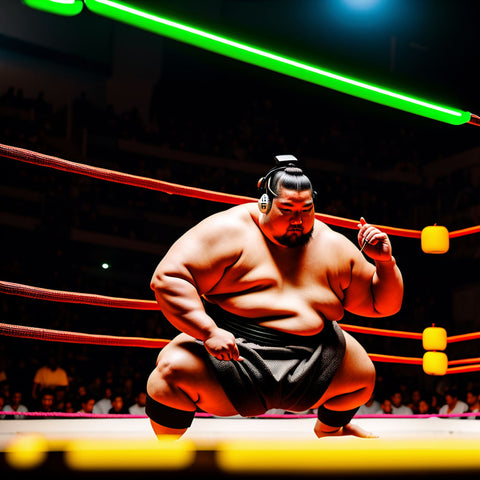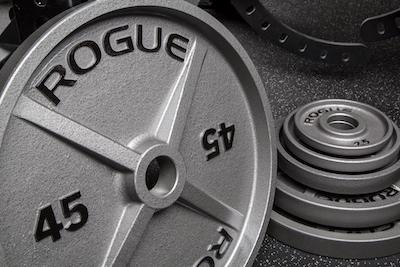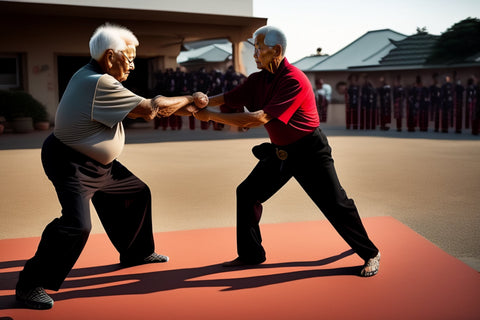The Bloody Truth: Why Boxers Taste Metal After a Fight
Imagine a boxer staggering back to his corner, mouth ache and adrenaline still coursing through his veins – and suddenly noticing a sharp, metallic tang in his mouth. Is it just the rinse water mixing with sweat, or something more ominous? For fighters, the coppery taste often is real blood or iron. In fact, a gloved punch to the mouth can nick a lip, bite a tongue, or burst a blood vessel, leaving the fighter literally tasting his own blood. But the full answer is richer: intense exertion can push tiny red blood cells from the lungs into the mouth health.osu.edu, and the surge of fight-or-flight hormones can alter saliva and taste perception onlymyhealth.com. Could this taste signal a hidden injury, or is it a normal byproduct of battle? We’ll dig deep into the science, listen to fighters’ own words, and explore what this metallic flavor really means – and how fighters handle it. How far can training and conditioning push the body before the mouth literally “turns” to copper?
Boxers Speak: “I tasted blood in my mouth.”
Boxers and trainers have long described this sensation in vivid terms. Critics say boxing fans want to see that raw cruelty – they enjoy the “taste of blood” moment, as one writer put it theguardian.com. But for the fighters themselves it’s both normal and alarming. UFC veteran Kenny Florian (now a commentator) vividly recalled bleeding in his fight: “He was bleeding all over me. Mentally, someone else’s blood pouring in your face and mouth is awful. I took three showers. I can still smell and taste it.”espn.com (Florian was talking MMA, but the ring is the ring.) Another knockout example: when Arturo Gatti body-punched Dorin, the latter later said the blow “gave me the taste of blood in my mouth like it had come up my throat.” Fight fans also note fighters grimace at the “penny-like” tang even with no visible cut – it becomes a shared, if brutal, rite of combat.
Trainers and cutmen prepare fighters for this. Top cutman “Stitch” Duran points out that pre-fight preparation can minimize surprises: boxers often apply scar-healing ointment (like Mederma or vitamin E) on old wounds to toughen the skin, and avoid blood thinners entirely. As one corner man explains, fighters “avoid using aspirin and Motrin, which increase bleeding time” espn.com. Before fights, a coach might press (or dice) out old tissue in cuts so they stay closed under stress. A solid mouth guard is a must – it protects lips and teeth, though even then a brush with the guard can grind out red. During the fight, if a boxer feels something “hitting” in the gums, he’ll often swallow or spit it (both come with a metallic aftertaste).
That metallic taste in boxing is a wake-up call for both body and mind — see how Mike Tyson trained his mindset to stay dangerous in the ring in this deep dive on mental preparation for fighters.

Let’s start with the simplest culprit. In boxing, trauma to the mouth is common. A sudden punch can tear the lips or gums, or a man may bite down hard. That immediate taste of blood is exactly what it seems – blood with its iron-rich hemoglobin. Iron on the tongue tastes like pennies. As one veteran fighter recounted after a sparring session: “I can still feel the taste of blood in my mouth — imagine sucking on a bunch of copper pennies — that metal taste of blood.” medium.com. Even world champions have described it. When Max Schmeling faced Joe Louis in 1936, a quick punch “caught me with a short punch to the mouth, and for a moment I had the sweet taste of blood on my tongue,” he wrote in his memoirpbs.org. And as promoter Bob Arum later related, Mexican fighter Miguel Berchelt, after a brutal loss, was “cursed in Spanish, as if in having that metallic taste of his own blood in his mouth” – a stark sign he’d gone too farespn.com.
That shocking metallic tang of blood in your mouth is a visceral reminder that boxing pushes both body and technique to the limit—speaking of technique, if you want to protect your hands and wrists as fiercely as you guard your chin, check out these top-rated boxing gloves built for unbeatable wrist stability.
Beyond obvious cuts, the body can produce that iron taste internally. When we exert ourselves extremely hard – sprinting, lifting, or fighting – fluid can accumulate in the lung’s tiny air sacs (a kind of exercise-induced pulmonary edema). This fluid pressure forces red blood cells to leak into the airspaces, releasing hemoglobin. Iron from hemoglobin triggers taste receptors on the tongue for a metallic flavor. As a sports medicine doctor at Ohio State explains, during intense anaerobic exercise our lungs can “leak red blood cells” into the air sacs, sending iron-loaded hemoglobin up the bronchi into the mouth. Once in contact with the tongue, iron tastes metallic health.osu.edu. In simple terms, you haven’t spat blood into your mouth – your body bled just a bit into your lungs from the strain of fighting, and you tasted the iron. (Interestingly, sport scientists note this isn’t usually dangerous in a healthy athlete. With rest and conditioning it often goes away health.osu.edu.)
Other Symptoms and Warnings
Does tasting metal mean your body is in big trouble? Often no for a brief episode. Cleveland Clinic experts note that in an otherwise healthy athlete, a lone metallic taste usually has harmless causes health.clevelandclinic.org. They emphasize: “If a metallic taste in your mouth is your only complaint, the cause might be one of several (benign) factors” health.clevelandclinic.org. In a boxing context, that might simply be a minor mouth bleed or the normal exertion effect. Fighters often shrug it off between rounds: rinse the mouth with water or spit into the sink. But if the taste persists for hours or days, or is joined by weakness, trouble breathing, severe headache, vomiting blood, or clear fluid discharge, it should prompt medical attentionhealth.osu.edumayoclinic.org. For example, coughing up blood or chest tightness could signal real pulmonary edema (in which case training should stop).
Another related issue: a metallic taste can accompany dehydration or acidosis (when heavy exercise produces acid buildup). When oxygen debt and lactic acid surge, some athletes note a sour or metallic tang. And if a boxer hyperventilates through the mouth, the dried-out mouth can exaggerate any taste. Good oral hygiene (clean mouthguards, brushing teeth) can also help limit weird tastes by removing blood residues and bacteria.
Prevention and Management
What can fighters do to prevent or counteract that iron tang? The key is conditioning and smart camp routines:
- Build Your Stamina Gradually: Progressive cardiovascular training helps. The Ohio State sports medicine team advises that rest and “decreased training intensity while developing cardiovascular fitness will decrease the likelihood” of these symptoms health.osu.edu. In plain terms, don’t spike into maximal exertion too quickly. If your heart and lungs are well-trained, you’re less likely to flood your lungs with blood at fight pace.
- Protect Your Mouth: A well-fitted mouth guard or headgear (in sparring) can avoid many cuts. At home, keep healing ointment on any scarred or thin areas. As one seasoned fighter put it, he “pre-treats his eyebrows and eye area with Mederma and uses vitamin E on old scars” espn.com to prevent split wounds. These small steps cut the chance of heavy bleeding.
- Avoid Blood-Thinning Substances: Steer clear of aspirin, ibuprofen, and alcohol around fight week, since these thin the blood. Even herbal supplements (like fish oil) can increase bleeding. Coaches routinely double-check that nothing in a fighter’s diet will exacerbate an oozing cut espn.com.
- Hydrate Wisely: Drink plenty of fluids in training (to keep mucous membranes healthy) but avoid guzzling excess water at once. Interestingly, some research on exercise-induced pulmonary edema suggests overhydration can increase capillary pressure. The safe bet: stay evenly hydrated, and if you feel that metallic taste coming on during training, pause, sit up, and swish water in your mouth. This can clear minor blood or iron taste.
- Technique in Breathing: Boxing trainers often teach controlled breathing, especially as you tire. Breathing through the nose (when possible) warms and filters air, reducing sudden lung stress. Exhaling sharply instead of gulping air can help stabilize intrathoracic pressures and might slightly reduce lung fluid shifts. (It’s a small effect, but proper breathing prevents a lot of issues.)
- Post-Round Care: In the corner, a good cutman (or even a coach with a damp towel) will have the fighter rinse his mouth or spit. Clearing away even a little blood stops the taste from dominating. Some fighters even sip ice-cold water to reset the tongue.
- Medical Readiness: If a fighter repeatedly experiences heavy blood-tasting episodes, it may indicate he’s being overtrained or developing an issue. Trainers will often schedule a checkup, possibly an EKG or lung exam, to rule out heart or pulmonary problems. Many trainers keep a doctor on-call for precisely these concerns. The consensus is: If in doubt, get it checked out.

Science and Studies: What the Experts Say
While no boxing-specific study looks at “boxer taste sensation,” the related sports medicine literature offers insight. The Ohio State athletic doctor Timothy Miller (who wrote the 2017 piece cited above) emphasizes that pulmonary microbleeds from exertion are well-known in medicine. His advice is practical: if the only symptom is a quick metallic taste after an all-out round, it’s usually benign; improve fitness and hydrate, and it will likely not recur health.osu.edu. Over months of training, most boxers report this feeling less often as their bodies adapt.
Researchers also highlight that other mundane factors can cause metallic tastes: missing your floss can do it, as can iron supplements or dental metals. But in a fight context, blood and lung factors dominate. Cleveland Clinic’s Dr. Donald Ford reassures us that “if a metallic taste in your mouth is your only complaint, the cause might be benign” health.clevelandclinic.org. Still, he and others caution vigilance: if other “red flags” appear (slurred speech, severe headache, chest pain), the metallic taste could be more than just a punch.
On the neuro side, studies of trauma patients show head injuries frequently come with taste and smell disturbances. A boxer who is dazed or concussed may report odd tastes (including copper) even without new bleeding. Finally, exercise science notes an interesting bit: some high-altitude or cold-weather training can exacerbate lung leakage; boxers training at high elevation camps (e.g. Olympic hopefuls) sometimes report more post-fight mouth tastes until acclimated.
The Takeaway for Fighters and Fans
For boxing fans, the metallic tang is a gritty reminder of the sport’s stakes. For fighters, it’s often just a signal: “That was a clean hit,” or “I’m really pushing hard.” It is usually the taste of blood or iron — not an unknown poison. But it commands respect for the body’s limits. As veteran fighters note, tasting blood can even be a strange motivator: a reminder you’re in the trenches. One trainer wryly says, “Fighters love bragging about tasting blood – it means they’re giving as good as they get.”
Still, the advice is to treat it as a warning light. Proper training, protection, and corner care can keep that metallic tang to a minimum. If a fighter starts hearing cinnamon after every spar or always finds pennies on his tongue, it’s time to taper off and check in with a doctor health.osu.edumayoclinic.org. With the right strategy, a fighter can stay in control of the fight – and his taste buds.
Sky Hoon. About
Martial Art Fan
He started his love on martial arts by watching MMA and Angela Lee. He then started this blog to learn more about the different martial arts.
Other Posts By Author








